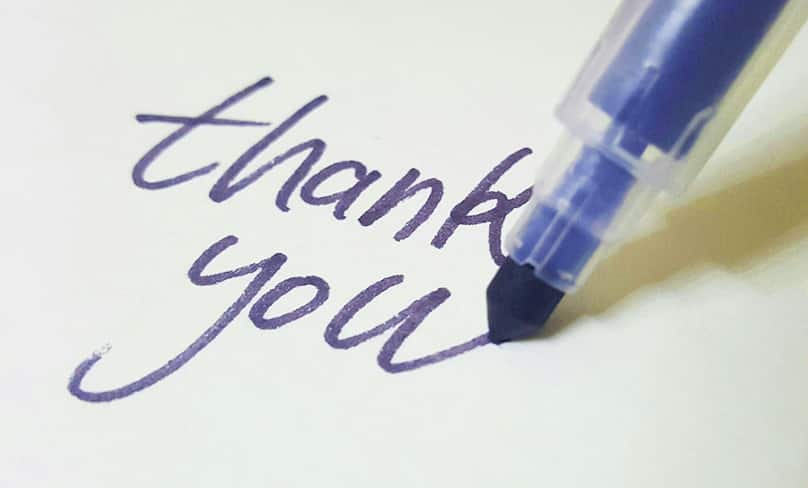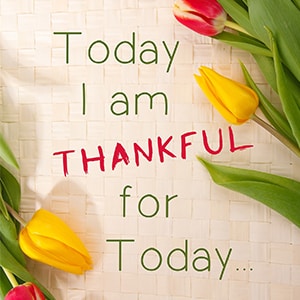
Every so often, a graphic about everyday gratitude circulates around the internet. It’s one of those memes meant to challenge your thinking, reminding you that you can always turn complaints on their heads, paw through every tangle of suffering and find the little nugget of blessing inside.
Sink overflowing with dishes? Be grateful you have food that was eaten off those plates!
Mountain of filthy laundry? Be grateful you have clothes on your back and a machine to wash them in.
Exhausted by childcare? Be grateful you’ve been blessed with children.
Worn out by your commute? Be grateful you have a job and a car to get there.
I have only ever seen two responses to this graphic: Either a guilty, “This is so good, I’m so bad about this. Thanks for the reminder to be better!” or “Screw this, Janet. You want me to feel grateful? Clean my bathroom while I take a nap.” Never once have I seen anyone say, “Yes! I follow this approach every day, and that’s why I am so happy!” Or actually I have, but these are people whose pants I have reason to believe are on fire.
It’s an odd thing, because I happen to have an unusual number of friends who approach life with true gratitude, who routinely thank God for the good things in their lives, and who earnestly strive to serve others because they are so constantly aware of the blessings they themselves have received. So why do these same people so vehemently reject the meme?
There are a few reasons. One is that it seems to downplay the very real condition of being overwhelmed, or even the inevitability of suffering itself. Suffering is suffering, and there really are some things that can’t be cured with a neat little mental flip. If we’re supposed to train ourselves to immediately flee from the very possibility of saying, “I’m in pain,” we’re essentially trying to train ourselves out of being human. This kind of training can have disastrous results, leading us to ignore serious problems that need to be fixed, not just pollyanna’d away; and it can also lead us to become hardhearted toward the suffering of others, because we come to believe that it’s somehow sinful to suffer.
If it’s wrong to cry out in pain when we suffer, then a good portion of the Psalms need to be expurgated from the Bible. I can hear it now:
We are brought down to the dust; our bodies cling to the ground.
Hey! A chance to lie down in the great outdoors? Sounds pretty sweet to me.
All flesh is like grass and all its glory like the flower of grass. The grass withers, and the flower falls.
What a relief for those who suffer with allergies!

Scripture makes it clear there is a time to weep. We are just as likely to meet Christ in darkness, sorrow, and suffering as we are in rejoicing and thanksgiving. That Man is all over the place, everywhere a human can be, and that includes the dark corners of our days; so it’s absurd to suggest that Christianity is only played out in broad sunshine, and that we’re failing when we express sorrow or disappointment.
Nevertheless. Even if there is a time for sorrow, there’s also a time for joy. It’s very possible to get stuck in weeping, to cultivate a habit of self-pity, to become hamstrung with griping and pessimism, to lose the power to see and enjoy the good things that do surround us, and this is a great loss. It really is good practice to acknowledge that we suffer in big ways and in small, but that we’re also surrounded by goodness and mercy.
So what’s the problem with the gratitude meme?
The main reason is that it’s imposed from the outside, rather than welling up from the inside. Gratitude that we dredge up because someone insists we dredge it up is not gratitude at all; it’s a counterfeit meant to placate guilt, like when a child takes a shower because his mother makes him take a shower, but by gum, he does not get clean. There is no clean like the clean achieved by someone who no longer wants to be dirty; and there is no gratitude like the gratitude felt by someone who earnestly longs to know that his life is truly good. This is entirely different from a mental exercise performed by someone who feels bad about not being a certain kind of person.
I know whereof I speak. Many years ago, feeling bogged down and hamstrung by self-pity, I decided to spend one entire day looking for the bright side in everything. When the baby howled, I thanked God that she had strong, functioning lungs. When the kitchen floor was gritty underfoot, I thanked God that I owned a broom and hands to wield it. When the cold wind blew through the uninsulated walls of our apartment, I thanked God that we’d enjoy spring all the more once this horrible cold passed us by.
You cannot imagine anything more foreign to my nature than this train of thought. It was one of the hardest mental exercises I’ve ever performed, and by the end of the day, I was exhausted from the sheer effort of hunting up all those silver linings.
And by the end of the day, I was almost singing. It was one of the happiest days of my life. It was so good that I return to the memory of it from time to time, and come away refreshed, because I saw so clearly the truth of how much goodness and mercy surrounded me on that day and every day. Maybe I’ll even try it again someday!
But I guarantee you that it would not have worked if it had been foisted upon me by someone who thought I was defective because I thought my hard life was hard. The holiest people I know are strict with themselves, but merciful and sympathetic to others.
So if you really feel you have a vocation to encourage gratitude in other people, work on lessening their burdens, rather than exhorting them to stand on their heads. It doesn’t fit so well into a meme, but that’s why we have a lifetime to learn how to do it.
